Text
Talking about University Life and Following Your Passion With Jessica Yu
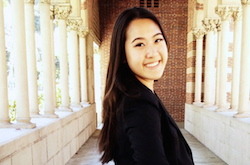
Jessica Yu is a USC Dornsife Sociology major, Student Consultant at the Information Technology Services Customer Support Center, and an aspiring social entrepreneur.
I see you are interested in social entrepreneurship and also involved in a lot of service and community outreach programs. What inspired you to be so deeply involved in social causes?
The summer of 2012 changed my life. As an incoming high school senior with absolutely no clue whatsoever regarding my future plans and prospective career, I discovered my passion, future aspirations, and calling for life that summer through a poignant, exhilarating, and eye-opening 3 week study abroad trip to Jinotega, Nicaragua for Poverty and Human Rights. My trip to Nicaragua not only opened my eyes to embrace global issues such as poverty and the universal lack of human rights but also confirmed my interest in studying society and its people. I was also emboldened to use my knowledge and confidence gained from my trip to stand up for the human rights of others and allow people to have a voice. My trip to Nicaragua inspired me to pursue my current, dream career: to become a global, social entrepreneur. I aspire to combine my concentrations in Sociology, Spanish, and Social Entrepreneurship to create an entrepreneurial organization centered on a united, global vision of solving social ills in Latin America. I strongly believe in using the power and social influence of business to positively implement change in others’ lives.
As you wrap up your first year at USC, did the actual university life meet the expectations you had before entering college? What has been the most difficult aspect for you in relation to university life?
Deciding to become a lifelong Trojan was the best decision I have ever made. I completely fell in love with the beautiful Los Angeles campus, global diversity, unrivaled alumni network, and vibrant school spirit. Here, dreams are limitless, unstoppable, and fearless. USC has definitely given me the resources and tools to succeed, from invaluable networking opportunities, to smaller classes, to a large gamut of student-run clubs, to organizations for engaging in public service. I’ve met so many inspirational, passionate people who, in just the course of a year, have already made an impact on who I am today. USC inspires me to believe that I can turn my dreams into reality, and I think the university’s incredible support to its students is unparalleled compared to anywhere else.
Overcoming my homesickness was by far the most difficult aspect in adjusting to university life. After a long, arduous battle against homesickness, I can happily say that I am adjusted now and I cannot imagine myself at any other school. However, I dearly miss my family, my beautiful hometown of San Jose, my friends, my dog, my car, and my mom’s delicious cooking!
Are there any future events or plans you have during your at USC that you are looking forward to? (travel abroad programs, etc..)
I have always dreamed of studying abroad in Madrid, Spain. Not only do I believe that Spain is a beautiful country, teeming with colorful culture, rich history, and delectable food, but I would love to take my Spanish to the next level by living in Madrid. By interacting with people on a daily basis and conversing in the Spanish language, my speaking skills will undoubtedly improve. I hope to study abroad in my junior year! In addition, I look forward to conducting research with the Department of Sociology and finding an internship in Los Angeles that will bolster my knowledge of uniting people, their communities, and social entrepreneurship altogether.
Learn More about Jessica
Twitter: @poopyjessi
LinkedIn: https://www.linkedin.com/pub/jessica-yu/8b/453/933
17 notes
·
View notes
Text
Getting Out of Her Comfort Zone by Serving with Gloria Kim
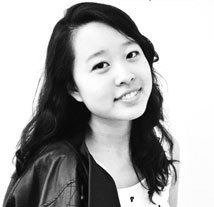
Gloria Kim is the Executive Director of USC Asian Pacific American Student Assembly (APASA). APASA supports the Asian Pacific American community by sponsoring cultural events and social events with and beyond the USC APA community.
Why did you decide to join Asian Pacific American Student Assembly and what has been your experience so far?
I actually kind of fell into it. In freshman year, I was really excited to join a lot of different organizations at USC, and I wanted to be able to see what I liked the best. In September or October that year, I went to an annual APASA event called Night Market. The event was really fun, and I was also able to meet a lot of great upperclassmen, who I'm still friends with to this day. After that, I decided to apply for the APASA internship program (partially because my friends were also applying). The rest is history! I've said it before, but joining APASA has been the best decision of my college career. Being in APASA has challenged me and has forced me to leave my comfort zone, and I am all the better for it. It's been such a great experience being able to serve other students at USC and being able to plan really cool events that are both fun and educational.
What have been your most memorable moments as part of APASA?
I have a lot of memorable moments being part of APASA, but I think one of them was my sophomore year during our speaker event with Kal Penn. I was the Heritage Festival Coordinator that year, and I was essentially responsible for overseeing all of APASA's major programming events for our Asian Pacific American Heritage Month. It was so stressful leading up to the event, but it was really amazing seeing such a large event come together! Kal is a really humorous, insightful speaker, and I loved that he got us all to think more about our APA identities, which was exactly what I had been hoping for.
Another memorable moment this year has been winning the Tommy for Best Cultural Organization! APASA has come a long way this year, and it was so cool to see those efforts being recognized. It was especially meaningful for me because I hadn't even really filled out the application! We had asked our executive board members to step up, and a lot of them did and helped complete the application. When we received the Tommy, I was really happy for APASA, but I also just felt really grateful for the team I worked with this year.
Overall, I think that it's hard to pinpoint really memorable moments because I feel like my experience in APASA has been defined by the small things and by the people in our organization. My happiest moments have been when I've just been able to relax with other people in APASA, especially after a great event.
What issues do you think affect the USC APA Community? And or, what type of message is the APASA trying to convey?
Our focus this year was to have quality events that have a good balance between the fun and educational. Through our programming, we try to encourage students to think about their APA identity and what it means to them. I think that's the first step here in the USC APA community! Though we are a minority group, we're not underrepresented at USC, which I think leads to a lot of us forgetting the significance of being APA.
What's something you think students would be surprised to learn about APASA?
Hmmm.. I don't know if people would be surprised, but I think we probably give out the most free bobas out of any student organization on campus...
On a more serious note, we also launched a lot of new programs this year! One of my favorite new programs is A Day in LA, where we took students to different ethnic enclaves in Los Angeles. Students were able to not only learn about the rich history of these different neighborhoods but also eat free KBBQ!! Now that's what I call APAwesome. :)
Learn More About USC Asian Pacific American Student Assembly
Website: http://www.uscapasa.com/
Facebook: https://www.facebook.com/apasa.usc
Twitter: https://twitter.com/USCapasa
8 notes
·
View notes
Text
Using Sports to Guide the Youth with Connie Chan
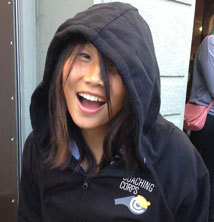
Connie Chan is the Interim President for USC Coaching Corps. The USC Chapter of Coaching Corps mission is to guide underprivileged children and influence them to stay positive through active sports.
Why did you decide to join USC Coaching Corps and what has been your experience so far?
I joined Coaching Corps because sports has played a significant role in my growth as a person, instilling characteristics of perseverance, commitment, and motivation and other traits that make me who I am today. And I hope to help develop these traits in the youth especially in lower income areas where playing organized sports may not be financially possible. But through Coaching Corps and volunteer coaches such as college students, we can help provide this opportunity for the youth to participate in organized sports.
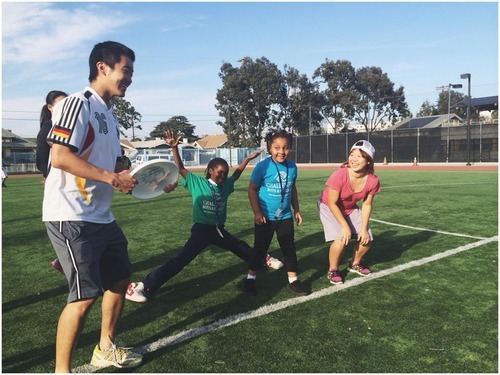
How often and what kind of events does USC Coaching Corps members take part in?
Coaching Corps puts on monthly Coach Huddles in which members or coaches can meet each other and talk about their coaching experiences. In addition, we discuss about upcoming Coaching Corps events. This past fall semester, we had our first Coach Volunteer Fair where interested students can talk to representatives from the partner organizations we work with which include Kids in Sports, Girls on the Run, A Place Called Home. And if they are interested in a particular sports program to coach, they can sign up with that particular partner organization to coach. In the spring, we also plan Take Your Team to College Day in which coaches bring their teams to the USC campus to hear a student-athlete panel and tour the campus and athletic facilities including the John McKay Center. For some this may be the first time they have stepped foot on a college campus. Through the Take Your Team to College Day, we hope to inspire the kids to set and aim for goals not only in sports but in their academics
What have been your most memorable moments as part of USC Coaching Corps?
My most memorable moments are when I see the faces in the kids and coaches light up. When the kids make a great play especially after struggling with a particular skill, the triumph and achievement in their eyes make coaching all the worthwhile. Also I had recently attended one of our coaches' basketball game in which his team beat a rival team they had never beaten before in the season. And afterwards, he was talking highly of his players and their improvement and his face overflowing with excitement and joy. The kids and the coaches are the reasons I hope to continue developing and building Coaching Corps here at USC.
What's something you think people would be surprised to learn about USC Coaching Corps?
People would be surprised to know that we work with partner organizations that offer a wide variety of sports programs that range from basketball, football, baseball, volleyball, but also boxing, running, dancing, yoga, ultimate frisbee and our partner organizations are always looking to start new programs.
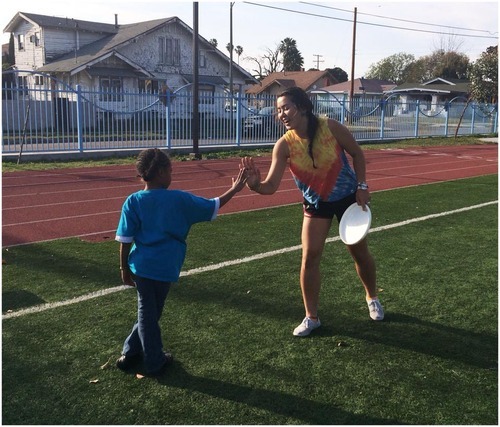
Learn More About USC Coaching Corps
Website: https://www.coachingcorps.org/chapter/coaching-corps-usc/
Facebook: https://www.facebook.com/CoachingCorpsUSC
Follow Connie on Twitter: https://twitter.com/chanconniechan
1 note
·
View note
Text
Helping the Residential Community and Guiding the Yearbook with Joseph Chen

Joseph Chen is the Public Relations Coordinator for USC Residential Student Government and the Photography Coordinator for El Rodeo Yearbook. In addition to coordinating photos for the yearbook he's also a staff photographer as well.
How did you get involved with USC Residential Student Government and what has been your experience so far?
My journey with Residential Student Government (RSG) began at the start of my freshman year, when it was still called University Residential Student Community (URSC). I was living at the Parkside Arts & Humanities Residential College and I ran for the Programming Chair position for my Building Government (the residence hall-level of the organization) because it reminded me of a lot of the work I did in high school. Over the next nine months, I worked with 12 other members within my own building government and over 100 representatives at the campus level to produce programs and initiatives addressing the concerns and interests of the residential community.
I didn’t reflect much on my experience within URSC until the close of my freshman year approached. Only then had I realized that the organization had a huge role in making my first year of college as positive as it was. And so I applied to the Executive Board, so I could continue being a part of the organization and could help foster the same experience for the next year of representatives.
As part of the Executive Board, I’ve had the pleasure of working alongside eight other enthusiastic and like-minded USC students. The greatest thing we all feel is getting to see all of our work come to fruition, whether it be designs being printed, events coming together, or winning awards at conferences.
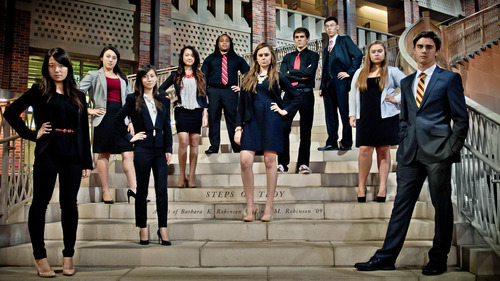
As the Public Relations Coordinator, what PR issues do you have to deal with?
My position in RSG covers several duties, including creating graphics, ordering promotional materials, managing our presence on social media, and maintaining our website. The heaviest of my work comes in chunks, especially over the summer prior to this school year, as I had to coordinate the rebranding of the organization and order materials with our new name, while far away from Los Angeles, where our office and our supplier are located.
Upon returning to USC, I shifted from developing materials meant to increase RSG publicity and encourage students to run for positions in their building governments, to producing graphics specific to the events organized by any one of our six branches (Advocacy, Community Outreach, Funding, Presidents, Programming, and Recognition) and larger annual events such as Spirits at Troy, Save Tommy Night, and Where in the World is Tommy Trojan?
Tell us more about your role as Photography Coordinator for the El Rodeo yearbook. What are you responsible for?
As the Photography Coordinator, I’m in charge of developing a visual direction for the yearbook, and creating a team of photographers who can help achieve that goal. That means when I’m not at the desk sorting through assignments and submissions, I’ll be training photographers on how to shoot certain assignments, maintaining the photography equipment we lend to staff members, or assisting my team out in the field. While photography and photojournalism are two of my great pursuits, I strive to let my staff members take assignments so that they can gain the experience and learn as I did my first year with the yearbook. I simply take on assignments for which we can’t find photographers.
Every year we have two elements for the yearbook, a theme and a coinciding visual project, with which I assist. This year’s publication actually features an extensive project where we brought out USC’s past and merged it with the present. It’s really only something you can see with your eyes (and this isn’t just a plug to buy the book; our designers and photographers did an outstanding job).
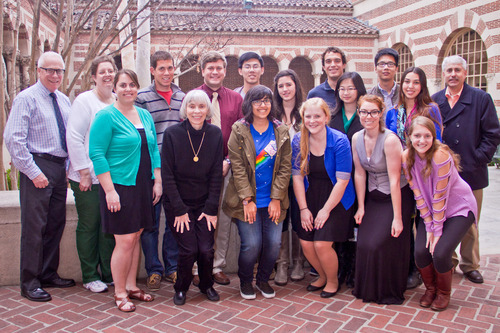
What’s something people would find surprising to learn about USC RSG and the El Rodeo yearbook?
USC RSG performs prestigiously on the national level of college residence hall organizations, in National Residence Hall Honorary (NRHH). Just this year, our submissions for “Of the Month” recognition bids, highlighting students, staff, and programs, have won 14 times regionally and twice nationally. This year we also won School of the Year and President of the Year (Sera Choi) regionally. At the end of May, a delegation will attend the National Association of College and University Residence Halls (NACURH) conference in Wisconsin, in hopes of winning nationally.
For El Rodeo, each yearbook actually covers the school’s events from the spring of the previous year to the early spring of the publication year. This is done because in order for the books to be printed in time for graduation, all pages must be sent to the publisher four months prior, by the end of January. This is beneficial on two grounds; one where the staff can spend more time working on assignments rather than being rushed to finish them and potentially sacrifice quality, and another where the incoming editorial staff and staff members wishing to continue the next school year can be trained and readied.
Learn More About USC RSG and El Rodeo
USC RSG Website: http://rsg.usc.edu/
El Rodeo Website: http://www.usc.edu/student-affairs/elrodeo/index.shtml
USC RSG Facebook: https://www.facebook.com/USCRSG
El Rodeo FacebooK: https://www.facebook.com/USCElRodeo
USC RSG Twitter: https://twitter.com/USCRSG
Follow Joseph on Twitter: https://twitter.com/techguychen
0 notes
Text
USC Art Law Society's Timur Tusiray

Timur is currently studying law at USC. He is the president of the USC Art Law Society and has a deep interest in law and the issues related to law surrounding the art world as well as other global issues in law.
What do you think the importance of art law is and how did you first become interested in this niche of law?
Art law is a little bit of a misnomer. As a practicing attorney, when you deal with art issues, you are really dealing with the law surrounding the art world. This can include anything from import/export, tax to employment and intellectual property. Therefore, to be a good "art law" lawyer does not involve having an intimate knowledge of art movements and trends, but rather to have a very solid foundation in practical legal work. That being said though, I think a passion for art and the art market is necessary if you want to work on interesting art issues. To me, art law is fascinating when you look at the global criminal aspects of the art market. The illicit trade in cultural objects is estimated to be anywhere from 200 millions dollars, up to 6 billion dollars annually. What I think is so interesting is that this illicit trade involves so many different players, from subsistence diggers (who do the actually looting of cultural sites at the source nation), to transnational organized criminal elements and possibly terrorist groups, to the end point high-end antiquities dealers, high net worth individuals and art institutions. Very little is actually known about this multi-billion dollar illicit industry, and so tackling it on a legal and policy level becomes very complex. That is what makes it so very intriguing.
I personally have always been involved with the arts. I studied art history and political science during undergrad, was a curator in Istanbul, Turkey, and I have begun to look at issues surrounding the arts and law now during my law school career. Currently, I am spending this semester working at the UN Office on Drugs and Crime, helping to develop a practical assistance tool that States can use to implement legislation and public policy to combat the illicit market on cultural property. As I had mentioned before, I enjoy this field because it compliments my general legal education. The issues an attorney will face working in the arts, are issues that a general practice attorney will see during their day to day.
As one of the presidents of the USC Art Law Society, what are some events or initiatives you've planned or have plans for this school year?
USC Art Law Society is great because of its versatility. The arts and law can encompass so many different areas, and we really try to bring representatives of those different realms to the school to speak to students and discuss the work that they do. In past events, we have had lunchtime talks with gallery owners, law firm attorneys, in-house counsel of various art institutions, as well as art museum directors and investigative reporters. We also have organized tours of the Fisher Museum, and have organized Downtown LA Art Walk adventures. We are a small organization at the school, with a very limited budget, but because of the breadth of the cultural community that the law touches upon, there is always an organization willing to work with us, or an event to be planned. Currently, we have an upcoming lunch talk with a practicing attorney who has worked extensively with cultural institutions both in her own practice and as part of a large law firm.
Upon graduation from law school, what would your ideal career look like, and how do you think USC can help you on your path to that career?
I plan on practicing law, and I think that the first couple years out of law school are incredibly important for your development as a successful attorney. That being said, I don't like the idea of having a set ideal of what my career will develop into, but I do know that after graduation I wish to begin that career in a law firm, surrounded by good mentors and substantive legal work. Luckily, being a student at USC Law not only gives you one of the best legal educations in the nation, but also access to a huge network of attorneys. At USC we are able to interact with extremely successful alumni who work in all fields of the legal industry, and who more than willing to offer their time and advice to students. The market is tough for newly graduated law students, but I think we have an edge that a lot of other schools do not.
Ways to Contact Timur
Email: [email protected]
0 notes
Text
Talking about Music Therapy with Li Hsuan
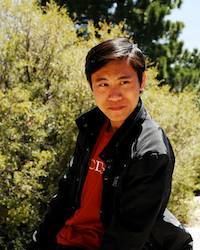
Li Hsuan is a double major in Math and Electrical Engineering at USC and is currently a member of Remedy through Music, a non-profit at USC which aims to perform music and spread the benefits of music therapy across Los Angeles.
Can you tell us more about your organization, Remedy through Music? What is the mission of the organization and what are some key events you hold throughout the year?
Remedy Through Music is a relatively new organization, founded in 2009 by a pre-med student Jane Huang. It aims to perform music therapy and spread the love of music to the hospitals, convalescent centers and other similar locations in the Los Angeles region by playing music for their residents. It is a non-profit organization that is totally student-run and is not linked with any other external or parent organization. A key event that we hold is the annual Chinese New Year performance at Little Sisters of the Poor, a elderly home in San Pedro. Members will prepare Chinese-themed pieces and dress in traditional Chinese costumes for the performance to perform for the residents. We have also been lucky to have some Chinese instruments in the performance, such as the guzheng (Chinese harp) and the dizi (Chinese flute).
I am also very glad to say that the organization has grown a lot since its founding and now holds performances at least once a week (normally on Fridays from 3.30pm-5.30pm but also sometimes on weekend afternoons) and has attracted members of all different majors, background, instruments and skill levels coming together for the same belief of music therapy.
Can you tell us more specifically about music therapy and some research regarding it's benefits?
Music therapy is a rather abstract concept to me, being an engineering student, but our members and myself have certainly seen the effect that music has on the patients or residents of the places we perform at. From the tears of joy of a bedridden elderly upon hearing the piece "Hey Jude" played by one of our cello players to the sing along to the hymns when we play them at a Korean Christian convalescent center in downtown, the effects are different for different people, and are often rather subtle since many of them are not very physically mobile.
With regards to more technical/specific benefits, here's a paragraph written by our past presidents--On a physiological basis, music has been shown to lower heart rate, blood pressure, and muscle tension; music also has been shown to decrease seizure activities within five minutes. Enjoyable music releases dopamine, which helps give the body and mind energy in times of stress, and norephinephrine, which helps control the brain’s reward and pleasure centers. Classical music especially helps to lower one’s cortisol levels, resulting in lowered stress.
How long have you been a musician and how much time are you able to dedicate to practicing music during the school year while keeping up with your academic pursuits in the engineering school?
I have been learning piano since elementary school, but stopped taking lessons in high school when academic pressures increased. I have found myself to be difficult to find time to practice piano before I joined the organization, but the regular performances as well as the occasional ensembles have certainly given me a lot more incentives to practice. As such, I have managed to commit a significant amount of time to the organization (more than 100 hours a semester including performances and meetings but excluding practices) and to the continual maintaining/improvement of my skills. A big part is about prioritizing and if something is of a high enough priority in your mind, you will find the time for it, that's a common statement for me. And by the way, I'm a double-major too in Math, so it is doable, haha.
Learn More About Li Hsuan and Remedy Through Music
Facebook: https://www.facebook.com/li.hsuan.3
Remedy Through Music: https://www.facebook.com/rthmusc
7 notes
·
View notes
Text
Bringing Engineering to Women with Cassandra Gabara

Cassandra Gabara is the President of Society of Women Engineers (SWE). SWE provides female engineers with a supportive community and a greater voice in the engineering industry.
Why did you decide to join Society of Women of Engineers and what has been your experience so far?
As a freshman, I wanted to join an organization that had tons of opportunities and a great network. I found out very quickly that SWE had those very qualities I was looking for. SWE executes so many diverse and impactful events. We have corporate networking dinners to facilitate networking between students and company representatives, community outreach events to encourage young females to pursue technical fields, and social events to spend time blowing off steam. The personal and professional network that I've built and maintained through SWE has been amazing, and I've grown a lot in my strategy and leadership skills. Overall, it is an amazing organization for female engineers to join at USC.
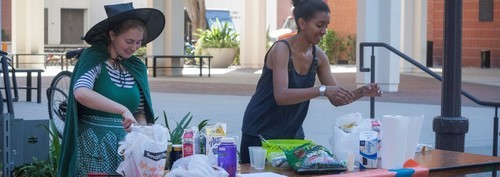
What have been your most memorable moments as part of SWE?
I think some of the greatest moments have been observing my fellow SWE Officers grow as leaders. Throughout my 3 years in leadership within SWE, I have seen my fellow SWE leaders learn from others, develop themselves, and excel in their roles. Many have successfully implemented new programs and events that hadn't existed before. To see their drive and passions come to fruition through new and impactful events is always something that I love to see as President.
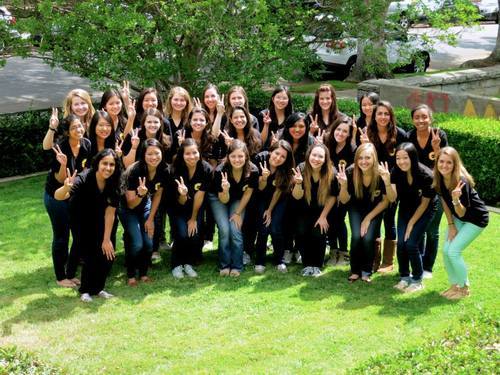
What's something you think people would be surprised to learn about SWE?
We are an all inclusive organization! We don't discriminate against non-female engineers. We accept anyone as a member who supports the mission of SWE, which is to support and inspire females in engineering! Every year we always have a handful of male members who like our organization so much that they decide to become members. It's great!
What type of community projects does SWE get involved with?
We do so much community outreach! Some of our annual signature events include Halloween Fun Fair and Girl Scout Badge Day. These are geared towards young girls, and during these events, we put on fun science-based activities. The purpose of these events is to get girls interested in science.
We started a new program this year called High School Outreach. During these sessions, we do more involved technical activities. Some of the activities we performed included a Python programming workshop, and designing a battery powered circuit. In an upcoming High School Mentorship event, we will host a panel of current engineering students to discuss their experience, and will also have USC engineering labs and organizations talking about their research and projects. The High School Mentorship Program is a great way to reach girls who are at a point in their life in which they are considering colleges and majors.

Learn More About USC Society of Women of Engineers
website: http://sweusc.com/
twitter: https://twitter.com/sweusc
follow Cassandra on twitter: https://twitter.com/CassGabara
0 notes
Text
Find Free Food at USC with uCap App - Now Available

We're happy to announce that our app uCap is opening up exclusively to USC for beta test. uCap lets you find events offering free food, refreshments, swag, & entertainment that's just for students at USC. In addition you can find and share photos from these events. Download the app to find out all the cool end-of-the-year happenings on campus.
Download uCap for iPhone
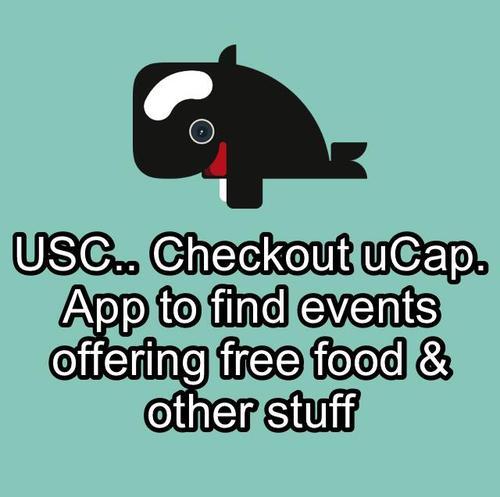
0 notes
Text
Brining the Love of Science to the Community with Kate Arnold

Kate Arnold is the President of Interaxon at USC. Interaxon is a dynamic club which visits underserved elementary, middle, and secondary schools to teach students about neuroscience in particular and science in general.
Why did you decide to join Interaxon and what has been your experience so far?
I joined Interaxon looking for a way to bridge my love of science, teaching, and community service. I was drawn in by the opportunity to interact with kids and make science fun and relatable through interesting lessons, using a simple mechanism to address the complex social problem of disparities within STEM fields. Since joining, I have benefitted from enhanced communication and public speaking skills, new relationships built within the context of service, and inspiring interactions with younger students in the community. The friendships I’ve developed with other E-board members and general members have greatly enhanced my experience, allowing me to interact with some of the most accomplished, dedicated, and inspiring people I’ve met at USC.

What have been your most memorable moments as part of Interaxon?
For my first school visit through Interaxon, I worked with several friends to present a lesson about the senses. After teaching elementary students all the lobes of the brain and which senses they control, we asked one of the students to be our “brain surgeon,” cutting out various lobes from a jello brain we had brought, which we said was the brain of the patient. Our patient would then stand up and act out which sense he was missing, and based on that, the students would guess which lobe had been removed. The students absolutely loved the lesson, and by the end of it could recite everything we had taught them. To me, this visit still exemplifies the kind of creative teaching we value at Interaxon that draws in all types of students and engages them in the learning process.
Another memorable moment took place last semester, when we held our first annual Neurocamp, a large-scale event bringing about 50 high school students to USC’s campus for a day of speakers, college-level experiments, and research lab tours tied together by a creative theme. Our E-board collaborated extensively and dedicated numerous hours to planning the event, and seeing the students’ reactions was overwhelmingly rewarding. They engaged with our speakers and asked questions that even the professionals weren’t able to answer offhand, dove in to a brain dissection and learned about the parts and functions of the brain, and expressed interest in getting involved in research themselves after touring faculty labs. Both of these memories underscore the most important aspects of service learning: the tremendous impact it has on the community, and the significant impact on the student educators themselves.
What's something you think people would be surprised to learn about Interaxon?
How much fun we have in our off time! We have an incredibly close-knit E-board and plan several social outings every semester, from barbecues to movie nights to happy hour at Bacaro. We welcome new members with open arms and, unlike many larger organizations, seek to become acquainted with them and build lasting relationships. For us, the service aspect of what we do is made even more meaningful because we collaborate with peers whom we respect, appreciate, and enjoy.
What challenges does the organization face and how do you deal with those challenges?
Last year, many of our original members, who were present when the org was founded, graduated and left behind an E-board who had not experienced as much of Interaxon’s history. While it was initially difficult to run our affairs without experienced members leading the way, we took advantage of the opportunity to reshape certain elements of Interaxon’s organization and revamp matters to suit our members’ needs and interests. Rather than allowing our group to stagnate, we have revitalized our school visit process and brought in new opportunities for service which weren’t previously in place, providing exciting avenues for our members to use their talents and interests to serve the community!
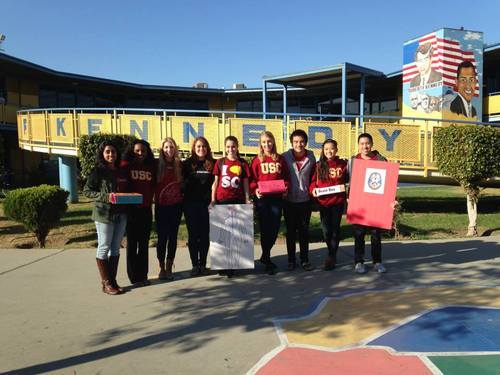
Learn More about USC Interaxon
website: http://www-scf.usc.edu/~interaxn/
facebook: https://www.facebook.com/groups/194218134504/
0 notes
Text
Bringing Healthcare to People Who Need it with Kalyn Reddy

Kalyn Reddy is the Co-President of USC Medlife. USC Medlife organizes mobile clinics in Peru, Ecuador, and Panama, support the Medlife fund, spread global health awareness, and work within the Los Angeles community to help extend healthcare to individuals
Why did you decide to join USC Medlife and what has been your experience so far?
I joined as a freshman to go on the spring brigade to Lima, Peru. I really liked MEDLIFE specifically because of the approach they take to their work. They use local doctors who can communicate with and relate to the patients, and the organization makes sure their patients get follow-up care after the brigades have ended. Also there are MEDLIFE headquarters in all of the countries they hold clinics in, so they're able to work with the local populations year round rather than just a few weeks a year like some other organizations.
My experience with USC MEDLIFE has been awesome. I've made some of my best friends on the trips and through e-board.
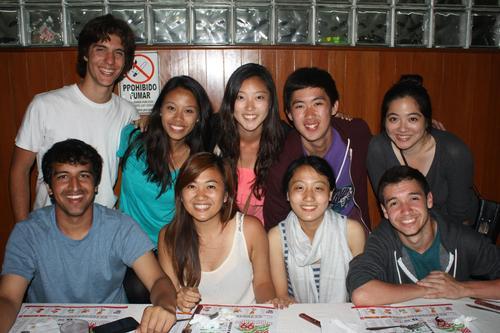
What have been your most memorable moments as part of Medlife?
The first time I saw a tooth get pulled was pretty crazy; that's something you never forget. But overall, my first trip to Lima was probably one of the most fun and memorable things I've done. It was what originally made me want to get more involved with the organization. Sending other students on brigades is always great because I know what an amazing experience they're about to have.
What's been the most surprising thing you've learned since being part of Medlife?
The most surprising and interesting thing for me has been the amount I have learned about how MEDLIFE functions on a global scale. In meeting some of the people who run MEDLIFE, I've gotten to hear about the trials and logistics involved in being effective as a non-profit, and talk with them about their long-term goals for the organization. Those conversations are always really thought provoking for me.

Learn More About USC Medlife
website: http://uscmedlife.wordpress.com/
facebook: https://www.facebook.com/uscmedlife
0 notes
Text
Focusing on Asian Health and Premed Issues with Alex Yuen
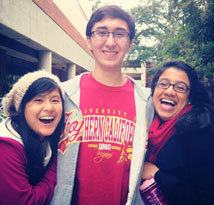
Alex Yuen is the co-president of USC Premed Asian Pacific American Medical Student Association (APAMSA).USC Premed APAMSA is focused on health issues related to Asian communities, exploring medical related careers and the medical school process, as well as offering members an opportunity to socialize with other premed students at USC.
Why did you decide to join USC Premed APAMSA and what has been your experience so far?
I originally decided to join USC Premed APAMSA during the APASA orientation before the start of freshman classes; I had seen APAMSA as a highlighted organization over there, so I decided to check it out. I ended up going to the first general meeting, and I met Katherine Fu, who was the original president of APAMSA since its founding. She helped me out a heck of a lot throughout freshman year, so I stuck around as a general member. I got to know a lot of the general members through volunteering events and socials, and APAMSA's general meetings always focused on mentoring the new premed students. I eventually became the treasurer during sophomore year, and, well, now I'm one of the presidents, too! Hopefully, I've been able to carry out some of Katherine's original mission - if I have been able to be half as good of a mentor to anybody as Katherine was to me, then I would say I've succeeded!
What have been your most memorable moments as part of APAMSA?
Probably my favorite memories as a member of APAMSA come from the org's volunteering events. When I was a freshman, I was pretty much the designated Spanish speaker for any of our events, so I'd always get to run around the health fairs. We always went to the volunteering events as small student units, so we got to know each other pretty well, too. This would always end up with me doing something pretty silly when we would go out after the events; I've been recorded on video eating szechuan peppers and getting stuck to velcro wall walls at the APASA Night Fair. Pleasure at my expense aside, I always enjoyed getting the chance to relax and laugh with other students. It gave an escape from the business of the normal academic life.
What's something you think people would be surprised to learn about APAMSA?
Going back on the previous story, I would probably say that most people would assume that APAMSA is entirely focused on giving premed students presentations on how to get through the rigmarole of "premed-ism" - that is, the undergraduate education and applications leading up to medical school. We probably discuss topics related to this in 80% of our general meetings, but this is done to live up to our organization's goals. We're, you know, actually human outside of this; our lives aren't engrossed absolutely in the premedical curriculum. Anybody can feel free to chill with us outside of APAMSA! We're mentors just as much as we are friends.
We saw in your bio that you voluteer at the hopstial. What kind of work do you do there, what's that been like?
I do volunteer at a hospital! I'm the generic premed student in that sense, I suppose. That said, I think I've gotten some experiences that most wouldn't be able to find. I work at the Methodist Hospital of Sacramento, where I usually am running around in the emergency department and the intensive care unit. My duties range from restocking to taking patient vitals. I've been working at the hospital for so long that I bounce between duties - it's just the nature of me being there. I think I've been there now going on ten years, so I know the personnel pretty well too. I've gotten the chance to go rounding with them, to help them in emergency procedures, and to work directly with patients. I'm in college now, so I only get the chance to work during summers. But, Methodist has become something of another family to me. It's not all business; the Methodist personnel are very welcoming, and I even join the doctors in the lounge sometimes to joke around and talk about news and whatnot. I always like getting to work in the hospital environment, even though I do work in two departments that are known for their difficulty. It seems supremely frightful, but, in turn, supremely frightful would be the effect of any human endeavor to abdicate his or her duty to others.
Learn More About USC Premed APAMSA
website: http://uscpremedapamsa.webs.com/
Follow Alex on Twitter: https://twitter.com/FromTheGrove
2 notes
·
View notes
Text
Engineering Greatness with Tau Beta Pi President Kirsten Rice
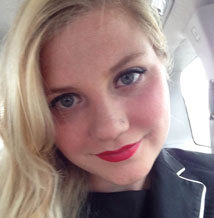
Kirsten Rice is the President of Tau Beta Pi (TBP). Tau Beta Pi is a national engineering honor society dedicated to promoting honor, integrity, scholarship, and more in the field of engineering. Membership is by invitation to students in the top of their class.
Why did you decide to join Tau Beta Pi and what has been your experience so far?
I decided to join Tau Beta Pi when I call my dad after receiving my invitation. I asked him if he had heard of it and he said yes, they had it at his university but that he didn't qualify when he was studying engineering. I was like yes! Smarter than my dad haha. But tau beta pi is also the oldest and largest engineering honor society. They also value character, leadership, and service. These values aligned with my interest so I decided to initiate.
My experience so for has been wonderful. I have engaged in career building activities, service, and many social events. It has been a great opportunity to meet so many talented engineers outside of my field and even outside of USC.
What have been your most memorable moments as part of TBP?
One of my most memorable moments has been attending the National Caucus. Each university send one voting delegate and have the option of sending more non-voting delegates. We work to make changes to the constitution and bylaws, but the process is really old school we are all in a big auditorium and have to shout yay or nay if we agree with or disagree with the changes. I also got to meet members from all over the states and they honored exemplary universities and award winners. I also love all the times we have been to kbbq or even engineering futures where representatives from district or nationals hold interactive workshops on workplace skills that we may not learn in the classroom.

What's something you think people would be surprised to learn about TBP?
Some notable Tau Beta Pi members are Neil Armstrong, Buzz Aldrin, Jeff Bezos, and Michael Bloomberg. So is Max Nikias (according to his Phi Kappa Psi Scholarship Awards Dinner speech) and 19 Nobel Laureates.
Tau Beta Pi also offers undergraduate undergraduate scholarships, fellowships, career assistance, discounts on FE exam materials and more.
Aside from TBP what other activities keep you busy?
I am also a captain of the marathon team, a member of Quasa and Asce. I do research in the environmental engineering lab. And I am a part of the alternative summer break to Uganda. And I have a minor in photography!
Learn More About Tau Beta Pi
website: http://viterbistudents.usc.edu/tbp/
0 notes
Text
Talking about High Tech and MBA's with Ketan Chaudhry

Ketan is a MBA Candidate with a strong focus on understanding the strategic challenges faced by the Technology departments of businesses at the cutting-edge of innovation
As president of the High Tech Association at USC, what are some events or initiatives you've planned or have plans for this school year?
I am actually the outgoing President of the HTA and served during the 2013-14 academic year. During the year, we successfully held an Industry Night in the Fall (where we had company representatives from companies such as Amazon, Google, Ericsson, Oracle etc. and Full-Time and Part-Time graduate MBA students network in a round-table style).
Over the winter-break we mobilized 90+ students for a Career Trek to the Bay Area. Over a period of 1 week, we visited some of the top high-tech companies located in the Bay, such as Google, Tesla, eBay, EA, Sandisk, Salesforce.com, AT&T Foundry, Ericsson, NetApp and many more.
In the Spring, we hosted Marshall's first-ever internal High-Tech focused case competition sponsored by AT&T.
Other than the 3 events listed above, we held many career and networking focused events such as Analytics (Tableau) workshops, mock-interviews, productivity tools presentation and some events specially targeted at international students interested in the High-Tech industry.
As high tech companies are start up companies become more prevalent in the LA area, what are some typical roles a non-technical MBA can find within these types of companies?
Product Management, Product Marketing Management, Digital Marketing, Internal Strategy and Analytics are all very popular roles for both technical and non-technical MBAs, with Product Manager roles being the most popular. The same goes for start-ups, with the difference being that a Product Manager at a large corporation is more of a Specialist, while one at a start-up may act as a Generalist. Very few companies such as Google, Amazon and Facebook actually explicit seek PMs with a technical degree or equivalent software engineering work experience.
Having worked in both the US and India in business strategy or technology positions at well known corporations, what are some key cultural differences you've experienced in your work environments?
Most global companies bring their corporate culture to whichever countries they establish their business in. The same goes for companies that I have previously worked at - Goldman Sachs, Deloitte etc.
Having said that, there are definitely some minor differences. For instance, as the India office for GS was the Technology and Operations hub for all other GS offices across the world, a team's work-hours were aligned with their global counterparts. This meant coming to office at noon and staying late into the night to support the London office, for instance.
The Indian office's community efforts are of course focused locally. Most of these firms accord a lot of importance to regular exchange of employees across offices to ensure competitiveness and deeper cultural contact.
Learn More About Ketan Chaudhry
Email: [email protected]
LinkedIn: www.linkedin.com/in/ketanchaudhry
0 notes
Text
The Art of Publishing with The Altar Collective Founder Katherine Hogan

Katherine Hogan is the founder and editor-in-chief of The Altar Collective, a small press publishing company brings together talented writers and gives them a friendly outlet to publish their works. Katherine transferred to USC as she found it the best place for her creative endeavors.
Not many people decide to start their own publishing company, why did you decide to start the Altar Collective?
My partner Chelsea Kirk and I started The Altar Collective in June of 2013. We are both English students that have always loved literature, especially poetry, and have been pursuing our passion in one way or another for years. Over the summer, we realized that we were surrounded by very talented writers, but many were either shy of the publishing market or never thought about it. We wanted to create an outlet that represented more of a family feel, since many publishing companies can be brutal and intense. We started The Altar Collective because we wanted to give talented poets and writers an opportunity to see their work in an actual book as well as meet other writers who shared the same passion. The Altar Collective has developed into a lot more than a small publishing collective, though. Many of our writers still keep in contact with us and participate in our events, as well as support our new projects, too.
What's your process for deciding who to publish and how do you find prospective writers to submit?
The Altar Collective has three series - poetry, featured writer, and our new Orchard Series. The poetry series is run by submissions. We have fortunately attracted an international crowd by reaching out to writers on various social media platforms, like Tumblr, which has a large community of talented and passionate writers. We have a review committee that goes through our submissions and analyzes the content and subject matter. We read each piece multiple times, then carefully decide on 10-20 poets that should be included in whatever volume we're working on. We just finished up Volume IV, and now we are moving on to Volume V, which will be a short story collective.
My partner and I choose the writer for the featured writer series. Our latest featured writer, Kris Kidd, is a model and internet sensation who I met when I was pursuing photography. We decided to publish Kris' collection of essays, titled 'I Can't Feel My Face', because we believe that they are strong and brutally realistic depictions of our current generation. They also give intense insight into aspects of Los Angeles that people tend to glamorize, such as the modeling industry,
Our Orchard Series is our new series, in which we give the reader a unique opportunity to dive into the mind of a musician. Our first musician and writer is native Singaporean Inch Chua. I met Inch this year and was immediately impressed with her character and talent - not only is she an incredible musician, but she is a very skilled artist and poet who really works with the music and art community. She has released two full length albums, and has participated in events such as TED and and South by Southwest. Our collaboration, "Between the Devil & the Deep Blue Sea", is a collection of Inch's personal diary entries that document her growth as an artist and individual.

What are the biggest challenges in starting your own publishing company?
Since my partner and I are both college students, the biggest challenge has been managing time. We are both full time students working and managing other projects as well as The Altar Collective, so having a balance among social, academic, and creative life has been difficult sometimes. We tend to get really excited about projects we're working on within The Altar Collective, which means we put off school or other responsibilities (sorry, mom!). Fortunately, we're surrounded by a lot of friends who are supportive and help us whenever we need it!
You transferred to USC in the Fall of 2013, why USC?
I decided to attend USC because I felt like it was the best place for me to thrive as a student, writer, and individual. USC offers very strong programs, especially within English and Creative Writing, and has a remarkable, supportive faculty. USC's location and involvement with the Los Angeles community is also very important to me. I am from Los Angeles, but recently have realized just how awesome it is to live and create here. Attending USC has definitely been the best decision I have made - every day I meet amazing students who are so talented and driven, and that alone has inspired me to continue pursuing my passions, like The Altar Collective.
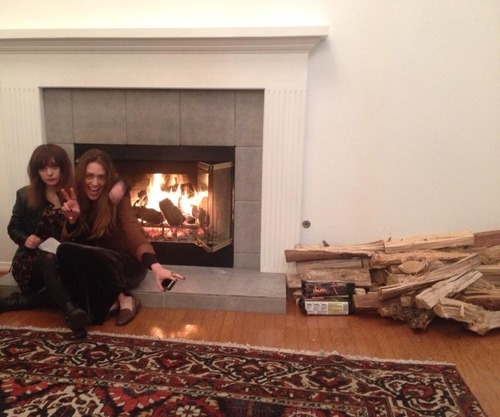
Learn More About the Altair Collective
website: http://www.thealtarcollective.com/
twitter: https://twitter.com/AltarCollective
facebook: https://www.facebook.com/thealtarcollective
Learn more about Katherine Hogan: http://www.kehogan.com/
1 note
·
View note
Text
Talking about Important Issues in Mental Health with Danny and Patra of USC Free Minds

Danny Lee is currently a student at the University of Southern California. He graduated Magna Cum Laude with a degree in Health and Humanity (B.A.) and is currently pursuing his second bachelors in Biological Sciences (B.S.) with honors distinction. He is also a member of the Phi Beta Kappa academic honors society and is a student researcher at the Eli and Edythe Broad CIRM Center for Regenerative Medicine and Stem Cell Research at the Keck School of Medicine.
Danny plans to attend medical school in the near future to become a psychiatrist or neurologist as well as a researcher of mental illness and neurodegenerative disorders. Eventually he hopes to become a leader in mental health advocacy and support.
Patra Childress graduated from USC in 2013 with a B.S. in Biological Sciences, and she is currently pursuing her M.S. in Global Medicine at the Keck School of Medicine of USC. During her junior year, she co-founded the student organization Free Minds with the goal of reducing the stigma surrounding mental illness and promoting the understanding of its complexities by shining a light on the individual experiences of people afflicted. She hopes that the awareness of mental health issues will lead to more informed healthcare policy and treatment. Patra plans to pursue a career in medicine, where she can utilize her understanding of mental health in her practice and act as a mental health advocate.
What is the "origin story" of Free Minds and what is the mission of organization?
Free Minds was the brainchild of its co-founders and presidents, Danny Lee and Patra Childress. From 2010 to 2012, Patra and Danny were classmates and members of a student organization called Health Today, an organization that brought awareness to general health issues facing the community. When the leadership team of Health Today graduated, Patra and Danny became its presidents; however, they wanted to refocus the mission of the organization to address a specific social issue facing their community. Meanwhile, during a semester at USC, Danny suffered from severe depression and felt stifled by the enormous stigma of mental illness both on and off the USC campus. Fortunately, through the support and help of his friends, family and therapists, a balanced lifestyle, and a renewed sense of purpose, he was able to overcome his condition. Angered and empowered by the deafening silence surrounding mental health issues on campus, Danny and Patra wanted to give students suffering from similar situations a voice to express their feelings in a welcoming and non-judgmental arena. With this resolve, Patra and Danny formed Free Minds to reduce the stigma of mental illness in the USC and the greater LA community.
What are some events and initiatives you have during the year to help accomplish you vision and goals of the club?
In its first year, Free Minds held weekly meetings open to members and interested students to discuss various mental health issues, such as mental health and gun laws, stress in the college population, mental health in veterans, and mental health in the media. During that time, we collaborated with student organizations like Interaxon to celebrate Brain Awareness Week and with departments, like the School of Cinematic Arts, to promote documentaries related to mental health and its social impacts, like Stevie. We also worked closely with a film graduate student, Jeremy Royce, to promote his documentary, “20 Years of Madness”, related to mental health awareness and to plan events that merge mental health and creativity.
Following the creation of the website, freemindsunited.com, Free Minds wanted to engage the entire USC community in a discussion on mental health and to understand and reduce the stigma of mental illness. In lieu of Mental Health Awareness Week, Free Minds, under the leadership of Danny and Patra, worked together to host the largest conversation on mental health in USC history, “Mental Health: A Dialogue” in October of 2013. The event featured panelists from a number of departments, such as the Counseling Center, DPS, Student Affairs, and Residential Education, faculty, as well as leaders from the LA County Department in Mental Health and the Didi Hirsch Suicide Prevention Center. The town-hall discussion engaged students with the administration to tackle the stigma of mental illness and the effectiveness and availability of mental health resources both on and off campus. Our conference was the first of its kind to address mental health in the USC population and give students a chance to openly voice their concerns. The conference was featured in the Daily Trojan (http://dailytrojan.com/2013/10/08/free-minds-hosts-mental-health-panel/) , and Vice Provost Ainsley Carry was also present at the discussion to comment on the timeliness of such an event.
After the huge success of “Mental Health: A Dialogue,” Free Minds continued to collaborate with organizations both on and off campus to work to reduce the stigma of mental illness. While on-campus, Free Minds has partnered with the Center for Women and Men and the Women’s Student Assembly to celebrate Domestic Violence Week and more recently to host a workshop on mental health as it pertains to women’s empowerment at the Women’s Empowerment Conference. On March 12 and 13, Free Minds is invited to present their work at the annual Saks Institute Symposium "MANY VOICES, ONE VISION: Assisting College and University Students with Mental Illness Make the Most of their Academic Experience” (http://weblaw.usc.edu/centers/saks/), the only USC student organization that will be presenting at such a prestigious event. At the end of March, Free Minds will also work with the Academic Culture Assembly to host a panel discussion on mental health to give students a safe environment to share their stories and concerns about mental illness.
For its off-campus initiatives, Free Minds has worked with the LA County of Department Mental Health to join the California coalition of organizations for mental health awareness, Each Mind Matters. We are also part of the LA Client Coalition, a group of people who share concerns about the mental health of the LA community and who decide on programs to address those needs. Our members have also participated in a number of mental health fundraisers, such as the Didi Hirsch Alive and Running 5K Run and the National Alliance on Mental Illness (NAMI) Walks, to connect with the local community and to raise money for mental illness. We also have partnered with The Painted Brain, an organization that gives people a chance to publish artwork and poetry related to mental health, to use visual and spoken media to address mental health issues.
You have submission section on your website where students can write, speak or act. Can you tell us a little bit more about this project and what type of submissions have you received thus far?
We at Free Minds worked together to build a website (freemindsunited.com) where people from all walks of life can share their personal stories of mental illness through creative mediums, like film, poetry, or spoken word. Thus was born the “Make it You” project, a collection of submissions that utilizes visual and spoken media to represent mental health issues from the perspective of those who have suffered or have experienced them firsthand. As of today, we have a variety of poetry, webcam monologues, and even a public service video that make up our ongoing “Make It You” project. By uniting in this forum, we hope to reduce the stigma of mental illness and paint a picture of mental illness from all its perspectives and its complexities. In other words, we showed that behind the veil of mental illness, there is a complex and unique individual in each and every person that deserves equal respect and love as anyone else.
More About USC Free Minds
Under Danny and Patra’s leadership, Free Minds grew from a small founding body of 4 members to a dedicated group of 17 members who take part in various leadership roles, such as event-planning, communication, video-editing, web-design, and outreach. We have not only changed the conversation of mental health on the USC campus through our groundbreaking “Mental Health: A Dialogue” event and through our proliferative collaborations with multiple resources on and off campus, but we have founded a revolutionary yet simple medium with which students can share their stories through our “Make it You” project. For the first time, students were able to interact with faculty and administration in a forum to openly discuss previously taboo issues pertaining to mental illness. For the first time, a student organization was able to achieve county-wide recognition for its achievements in mental health advocacy. For the first time, film, social media, and mental health are merged together cohesively to channel mental health awareness in a socially provocative manner. From its humble roots, Free Minds with Danny and Patra’s inspiration, has taken a small grassroots idea and through determination, risk-taking, and passion, turned it into an actuality that will continue to make positive impacts on the USC culture and the surrounding LA community. In the future, Free Minds will continue to put on such events at USC to address mental health in the college population and will begin projects in the LA community to attack mental health issues facing various populations, such as the homeless and the elderly.
Learn More About USC Free Minds, Danny and Patra
Website: freemindsunited.com
Facebook Page: https://www.facebook.com/pages/Free-Minds-United/160440724159844
Facebook Group: https://www.facebook.com/groups/uscfreeminds/
Danny's Email: [email protected]
Patra's Email: [email protected]
0 notes
Text
Meet Developer and Hip Hop Dancer Evan Zhou
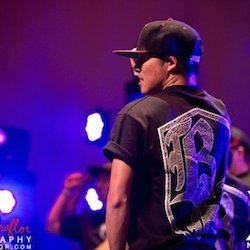
Evan Zhou is a front-end web developer, amateur hip hop dancer and an aspiring entrepreneur. He studied mechanical engineering at USC.
You went from studying mechanical engineering and working professionally as a mechanical engineer to being a front end software developer. What sparked the drastic change in the direction of your career?
I wasn't really sure why I studied mechanical engineering. I just knew that I wanted to do something technical, and I was good at math and physics so I chose mechanical engineering. I remember in AME101, the professor asked who in the class wanted to work on cars. Nearly everyone raised their hands except for a couple of us. In hindsight, that was probably a red flag. 4 years later, I got my first job out of college and hated it. I wanted to find something new, but it was pretty difficult trying to go through the conventional path of applying for different companies. I then thought about making my own products, which led to me really diving into the startup world. I was hooked. I thought about all the problems I could solve, but had no way of doing it. So I wanted to learn to code to be able to prototype what I imagined. Luckily, I discovered General Assembly and took their Front End Web Development course, and the timing was perfect because my teacher luckily knew someone who was hiring. And now I'm a web developer!
Being part of and managing a competitive hip hop dance group at USC sounds awesome. Besides the fun factor, can you tell us a little bit about how you got into that and what leadership or organizational skills you gained from the experience?
I got into dance because I used to watch a bunch of breakdancing videos on YouTube, and I started learning to bboy in highschool. I got to USC and wanted to continue bboying, but thought I'd try out for the competitive hip-hop team on campus, Chaotic 3. I somehow made it and loved it. I've been constantly training and dancing since then, and eventually became a Co-Artistic Director for my last two years at USC. I also joined a competitive team called GRV and had some amazing experiences with them, including competing against some of the best teams in the world and performing in Sweden. I've learned a lot leadership from both being a leader and being led, and the biggest thing I learned is that everything in an organization pretty much is a reflection of the leadership. It's also taught me to be open to critique and be able to communicate with people effectively. There will always be people doubting you and have issues, but there's probably a reason they think that. If you're not open to critique, you can't grow as an individual or as a leader.
Many alums find that being a part of the Trojan network has benefits. No matter what field or city you find yourself in, the chance of finding others in the "Trojan Network" are high. Have you benefited from being a part of this network? if so, how?
I actually can't think of any direct benefits I've had with being a Trojan alum, but it's always a great conversation starter when I meet a fellow Trojan. It feels like some rapport is instantly built, and I'm sure it'll help more down the road. But I'd love to help and go out on a limb for fellow Trojans in the future!
Learn More about Evan
Twitter: https://twitter.com/evanczhou
0 notes
Text
Making an Impact Through Teaching Guitar and Music with Alexei Naumann
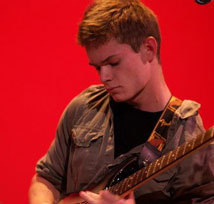
Alexei Naumann is the President of SLAM! at USC. SLAM! Program Los Angeles is a project of Community Partners and engages a network of passionate college student volunteers to teach after-school music classes in underserved public high schools.
Why did you decide to join SLAM and what has been your experience so far?
I heard about SLAM! through my roomate who happend to pick up a flyer on Trousdale. I had been very musically active in high school (playing in orchestras, rock bands and taking private lessons) and I thought this program would be an excellent way to remain just as active in college. In addittion to just playing music though, SLAM! gave me the opportunity to share my love of music with under-privelaged high shool students from areas surrounding USC. These students go to high schools where music classes were cut or just never provided. Having a free after-school music education program like SLAM! gives these kids a chance to do something and learn something that they may never have been able to do otherwise. My experience with SLAM! has been nothing short of life-changing. I've been able to transfer my love and interest in music to students who prior to taking classes with SLAM! had never picked up a guitar, keyboard or microphone. Although many of us forget it, getting the chance to go to a school like USC is a really rare opportunity afforded to few people. SLAM! has given me a way to stay actively involved in the local community and to bridge the apparent gap between USC students and local LA inner-city residents.
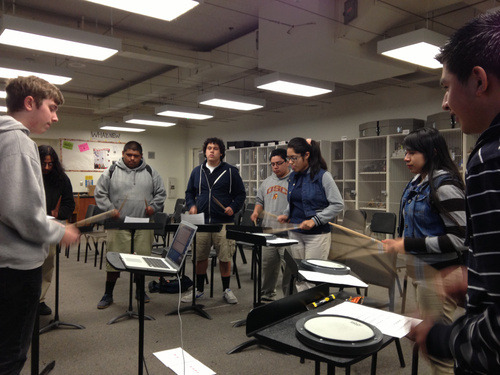
What have been your most memorable moments as part of SLAM!?
As a volunteer for SLAM! my most memorable moments have been in the classroom; teaching guitar once a week for an entire semester. Its difficult to convey the excitement you get from teaching anyone something they had no knowledge of before and then having that same student radiate their new-found talent and knowledge with an equal level of excitement to the rest of their friends and peers. As a teacher I got to see this happen every day I went to teach at a high school down the street from USC. Seeing students who initially didn't even know how to hold a guitar starting to play chords and songs on their own from memory has impacted me in a profound way. As the president of SLAM! at USC my most memorable moments have been recruiting and talking to volunteers equally as passionate about teaching music and making a difference. Knowing someone is willing to give up hours from their crazy collegiete schedule to teach free classes on a weekly basis really makes me respect that individual more as a person.
What's something you think people would be surprised to learn about SLAM!?
The fact that such a program hadn't already existed at USC prior to the Spring 2013 semester was surprising to me. When people see the charisma and knowledge demonstrated by our volunteers in their respective teaching environments they're surprised to learn that not only are these volunteers college students, balancing teaching with a full slate learning and studying at USC, but, that these volunteers have never tought music in a classroom setting. This, I think, is a testament to the passion and dedication of our volunteers and more importantly the passion and dedication of SLAM!'s founder Roi Matalon with whom we all work closely on a day to day basis to keep our operation running smoothly.
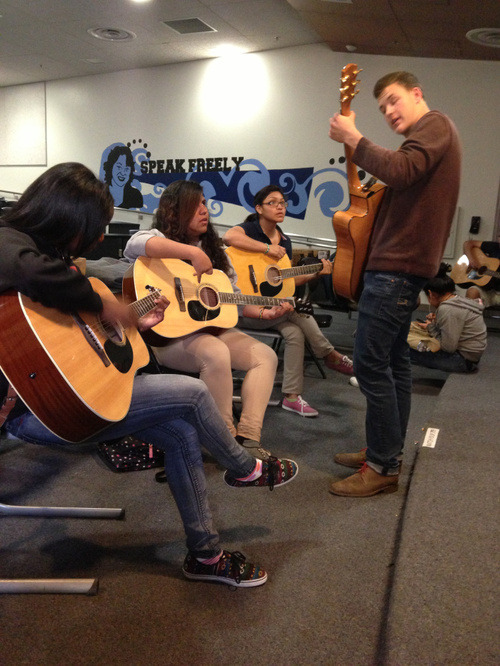
What is the biggest challange facing SLAM! and how do you deal with it?
Currently, our biggest challange is spreading SLAM!'s name and mission around campus and getting more and more capable volunteers to apply. I think the opportunity and rewards of such a program speak for themselves but, getting the attention of musically-knowledgeable and passionate students at USC is a little easier said than done. Many of our volunteers pass out our flyers every semester on Trousdale to attract new volunteers. We've also recently started to take on a large prescence in the realm of social-media as a way of spreading our message and garnering interest in our amazing program. Just recently, SLAM! started its first big campaign to raise donations for our cause. If you would like to spread the gift of music instruction to more deserving high schools in the Los Angeles area or even high schools around the nation consider following this link (http://bit.ly/1jKH6GL) and making a donation.
Learn More About SLAM!
website: http://trojanslam.com/
facebook: https://www.facebook.com/slamprogram
twitter: https://twitter.com/SLAMProgramLA
0 notes